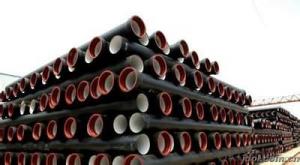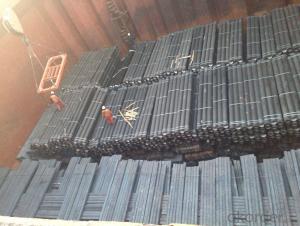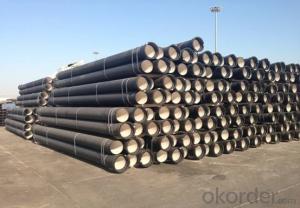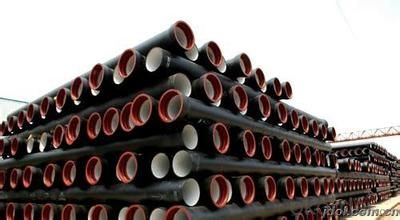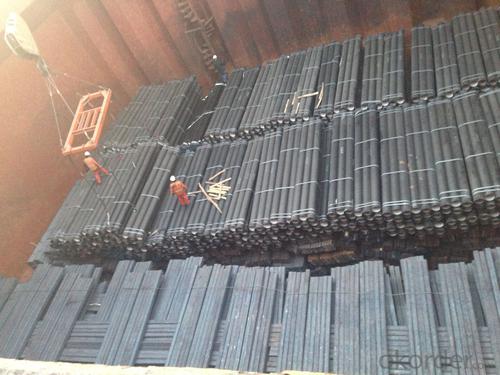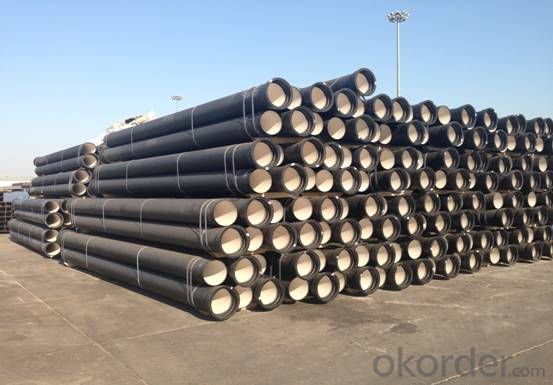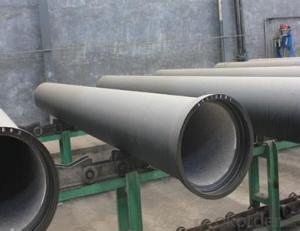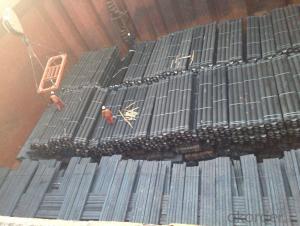DUCTILE IRON PIPE K8 DN1100
- Loading Port:
- China Main Port
- Payment Terms:
- TT OR LC
- Min Order Qty:
- -
- Supply Capability:
- -
OKorder Service Pledge
OKorder Financial Service
You Might Also Like
Ductile Iron Cast Pipe is without any defects compare with tradition casting tech, which has many advantages particularly as follow:
(1) High density. In the "vertical upward casting" process, the melt iron of centre liquid column in center crystallizer is continuously feeding for volume shrinkage caused by condensation tube at outer circumference , which lead to be free of shrinkage porosity.
(2) High purity. When melt iron pouring, the mixed impurities such as gas, dross, sand grain which are lighter than melt iron could be eliminated at furnace mouth, its impossible to enter into the crystallizer through the channel, so the melt iron into the crystallizer is very pure.
(3) Strength with toughness. The cooling speed provided by continuous crystallizer is 30 times than sand casting and 5 times than centrifugal casting, and doesn't produce white iron, the eutectic cell volume of continuous cast iron is one eighth to one tenth compare with traditional cast iron. The density of graphite nodule in ductile iron can reach 300-700 pcs/mm2. Therefore, all reason above improve the strength and toughness of continuous cast iron.
(4) Free machining. The high speed cooling make the hardening phase (such as boride, steadite) not appear like reticular, massive or thick, but diffuse like fish bone and pane in shape, moreover, there are tiny graphite flakes inlaid hardening phase. It's free machining in BrinellHardness the range of 250-300HB. However, the Brinell Hardness of 250 is top limit to common metal materials.
(5) Uniform composition of tube wall. The convection mixing of liquid column caused by marching type drawing in crystallizer make the composition of tube wall well-distributed, and concentration gradient very little.
(6) High productivity. To the wall thickness of tube under 10mm, the speed of continuous casting is 1 meter/min, to the wall thickness of tube under 20mm, the speed of continuous casting is 0.5 meter/min, which is high efficiency that centrifugal or other casting tech couldn't reach.
- Q: How does ductile iron pipe handle soil movements and settlements?
- Ductile iron pipe has gained a reputation for effectively managing soil movements and settlements. Its ability to accommodate ground shifts and settling without compromising its structural integrity is attributed to its flexibility and durability. A notable characteristic of ductile iron pipe lies in its inherent strength and resilience. It can endure external pressures and stress caused by soil movements, including lateral forces and ground settlement. This is due to its high tensile strength, which enables it to resist deformation and maintain its shape even under substantial loads. Furthermore, the flexibility of ductile iron pipe plays a crucial role in its capacity to handle soil movements. The pipe's natural flexibility allows it to absorb the impacts of ground shifts and movements without fracturing or breaking. It can bend and adjust to changes in the surrounding soil, minimizing the risk of pipe failure or leakage. Additionally, the joint design of ductile iron pipe contributes to its effectiveness in managing soil movements and settlements. The installation employs a push-on joint system that permits some movement and settlement without compromising the overall integrity of the pipeline. The joints can absorb and distribute stress and movement, minimizing the risk of pipe failure. In conclusion, ductile iron pipe excels in managing soil movements and settlements. Its strength, flexibility, and joint design enable it to withstand external pressures resulting from ground shifts, settling, and other soil movements. As a result, ductile iron pipe is a reliable choice for a range of applications where soil movement is a concern.
- Q: Can ductile iron pipe be used for high-pressure gas systems?
- Ductile iron pipe is a viable option for high-pressure gas systems due to its remarkable strength and durability. Its ability to withstand high pressures makes it suitable for applications requiring such systems. It possesses outstanding mechanical properties, including high tensile strength, yield strength, and impact resistance. These properties enable it to endure the pressures associated with gas transmission. Additionally, its resistance to corrosion ensures its reliability for long-term use in high-pressure gas systems. However, to ensure optimal safety and performance, it is crucial to consider the specific requirements and regulations of the gas system and seek guidance from industry professionals for correct installation and maintenance of the ductile iron pipe.
- Q: Are ductile iron pipes suitable for installation in areas with high soil compaction?
- Yes, ductile iron pipes are suitable for installation in areas with high soil compaction. Ductile iron pipes have high strength and durability, allowing them to withstand the pressure exerted by compacted soil. They can effectively resist external loads and provide long-term performance, making them a reliable choice for such areas.
- Q: Are ductile iron pipes resistant to acid mine drainage corrosion?
- Yes, ductile iron pipes are generally resistant to acid mine drainage (AMD) corrosion. Ductile iron is a highly durable material that has been widely used in various industries, including mining and water distribution, due to its excellent corrosion resistance properties. Acid mine drainage is a significant environmental problem that occurs when water comes into contact with sulfide minerals in mining areas, resulting in the formation of sulfuric acid. This acid can corrode and deteriorate various materials, including pipes, leading to infrastructure damage and water contamination. Ductile iron pipes have a protective layer formed by a cementitious lining, typically made of cement mortar or an epoxy coating. This lining acts as a barrier between the corrosive AMD and the pipe material, preventing direct contact and reducing the likelihood of corrosion. Furthermore, ductile iron pipes have a high resistance to both internal and external corrosion, making them well-suited for environments where acid mine drainage may be present. They have proven to be highly reliable and long-lasting even in harsh conditions, ensuring the continued integrity of the water distribution system and minimizing the potential for leaks or failures. However, it is important to note that the resistance of ductile iron pipes to acid mine drainage corrosion can also depend on several other factors, such as the specific composition and concentration of the AMD, the duration of exposure, and the temperature. Therefore, it is recommended to consult with experts and conduct proper material testing and analysis to ensure the suitability of ductile iron pipes in specific AMD environments.
- Q: How much water seepage is allowed in the water pressure test for water hose DN300?
- For water polo hose DN300, hydraulic pressure test allows water penetration to be 17.60 m3 / (24h km).The water pressure test of the indoor water supply pipeline must meet the design requirements. When the design is not specified, the test pressure of all kinds of material supply piping system is 1.5 times of the work pressure, but not less than 0.6MPa.
- Q: What is the expected thrust restraint method for ductile iron pipes?
- Typically, to achieve the expected thrust restraint for ductile iron pipes, mechanical joint restraints are employed. These restraints are designed to counteract the axial forces or thrust caused by the fluid pressure within the pipe. Thrust blocks, tie rods, and harness restraints are the most commonly used types of mechanical joint restraints for ductile iron pipes. Thrust blocks are concrete structures strategically placed around the pipe joints to resist the thrust forces. They are typically constructed at bends, tees, and other directional changes to prevent pipe movement. Tie rods, on the other hand, are another frequently used method of thrust restraint. These involve steel rods that are anchored to the pipe and securely fastened to an immovable structure to counter the thrust forces. Harness restraints, however, are constituted by a series of steel rods or cables that encircle the pipe and are anchored to the ground on both sides. These restraints effectively distribute the axial forces along the pipe's length, preventing movement and ensuring stability. The choice of a specific thrust restraint method for ductile iron pipes may vary depending on various factors such as pipe diameter, fluid pressure, soil conditions, and local regulations. It is vital to consult industry standards, engineering guidelines, and local authorities to determine the appropriate thrust restraint method for a particular application.
- Q: Can the underground cast iron pipes be connected with clamps to form buttress?
- The clamp hoop is a connecting device for connecting pipe fittings, valves and pipe fittings with grooves. Used in the fast joint between the role of tightening, the general two joints with gaskets, rubber, and silicone, ptfe.
- Q: Can ductile iron pipes be used in contaminated soil conditions?
- Yes, ductile iron pipes can be used in contaminated soil conditions. Ductile iron is known for its strength, durability, and corrosion resistance, making it suitable for various soil conditions, including those contaminated with chemicals or other pollutants. The material's resistance to corrosion ensures that the pipes can withstand the harsh conditions and maintain their structural integrity over time. However, it is important to consider the type and level of contamination in the soil and consult with experts to determine if any additional protective measures or coatings are required to ensure the long-term performance of the pipes.
- Q: How can the steel plastic composite pipe be connected with the cast iron pipe?
- Use stainless steel clamps to connect.
- Q: How much is the installation fee of the 400 largest ductile iron pipe?
- Compared with the PE pipe, from the installation time, ductile pipe PE pipe installation is simple and rapid, and after the installation of internal and external pressure bearing better tightness and corrosion resistance; from the point of view, ductile pipe sealing better after installation, but also can improve the corrosion resistance through various anti-corrosion methods;
Send your message to us
DUCTILE IRON PIPE K8 DN1100
- Loading Port:
- China Main Port
- Payment Terms:
- TT OR LC
- Min Order Qty:
- -
- Supply Capability:
- -
OKorder Service Pledge
OKorder Financial Service
Similar products
Hot products
Hot Searches
Related keywords
